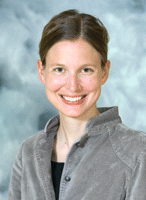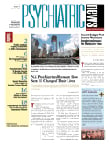Early career psychiatrist Claudia Reardon, M.D., is quick to acknowledge that each person has but a limited amount of time and energy to dedicate to the fulfillment of professional goals.
Yet shortly after graduating from her psychiatry residency training program, Reardon has managed to make a significant impact on colleagues, patients, and residents at the University of Wisconsin School of Medicine and Public Health, where she is an assistant professor of psychiatry and associate residency training director in the Department of Psychiatry.
In turn, her outstanding professional endeavors have earned her a fellowship from the World Psychiatric Association (WPA), which will provide funding for her to attend and participate in its 15th World Congress of Psychiatry in Buenos Aires, Argentina, in September.
The WPA selects just one early career psychiatrist from each of its member societies to attend the World Congress. Reardon is the psychiatrist selected from APA.
"I am thrilled to be selected for this honor," Reardon told Psychiatric News, noting that she expects that the fellowship will aid her in creating international educational opportunities for psychiatry residents.
The WPA fellowship is awarded to psychiatrists under age 40 who are no more than five years beyond their psychiatry residency and who have built an outstanding professional and educational record early in their careers.
Although barely a year out of residency training, "Dr. Reardon has already distinguished herself as a leader and an educator within psychiatry," noted David Fassler, M.D., APA treasurer and a clinical professor of psychiatry at the University of Vermont. "She also has an impressive and extensive history of involvement in organized medicine."
Fassler is one of the psychiatrists who nominated Reardon for the fellowship.
Among her accomplishments, Reardon has played an active role in APA and in her district branch, the Wisconsin Psychiatric Association. Within APA, she has served on the Committee on Women, the Council on Advocacy and Government Relations, and the Council on Communications. She is also a member of APA's Board of Trustees Work Group on Health Reform and Parity.
Locally, she has served as the annual meeting chair for the Wisconsin Psychiatric Association and as the early career representative on its executive council. She has also represented residents and fellows on the board of directors of the Wisconsin Medical Society and been a delegate from Wisconsin to the AMA Resident/Fellow and Young Physician sections.
In 2008, Reardon received the AMA National Foundation Leadership Award and was once again honored for her contributions to graduate medical education earlier this year from the Accreditation Council for Graduate Medical Education with the David C. Leach, M.D., Award.
In her position at the University of Wisconsin, she is closely involved in the supervision, teaching, and mentoring of psychiatry residents and, to a lesser degree, medical students.
"This is the most rewarding aspect of my work," she said, because teaching is one way she believes that she can make a positive impact on future generations of psychiatrists and, subsequently, their patients. Reardon has also developed a quality-improvement curriculum for psychiatry residents at the University of Wisconsin and worked closely with the school's Department of Neurology to develop a neurology didactic program designed to improve psychiatry residents' neurology expertise.
Reardon has further plans to enrich the learning experiences of residents through the creation of a global psychiatry elective that would take trainees to a developing country such as Kenya or Guatemala, for example, or to disaster sites in various parts of the world.
She said she plans to use the WPA fellowship award as an opportunity to meet with psychiatrists from around the world who may be involved in endeavors similar to the ones in which she has been active and who can share their expertise with her.
"The WPA fellowship will afford me greater perspective on my psychiatry education and on advocacy work," she said.

